|
|
|
Sort Order |
|
|
|
Items / Page
|
|
|
|
|
|
|
| Srl | Item |
| 1 |
ID:
086357
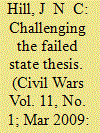

|
|
|
|
|
| Publication |
2009.
|
| Summary/Abstract |
With the onset of civil war in the early 1990s, Algeria appeared to join the growing list of failed African states. The idea of state failure has developed over the past 20 years and is now common currency amongst academics and political leaders alike. The aim of this article is to investigate the analytical usefulness of the academic state failure literature, and its ability to explain the onset and development of socio-political crises in post-colonial African states. The article identifies two important weaknesses in this literature: its dichotomisation of the international and domestic spheres, and the emphasis on domestic factors in its explanation of why such crises occur. Through its analysis of the International Monetary Fund's (IMF) and World Bank's interventions in Algeria between 1994 and 1999 the article substantiates the criticisms it makes of this literature.
|
|
|
|
|
|
|
|
|
|
|
|
|
|
|
|
| 2 |
ID:
086355
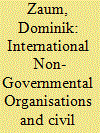

|
|
|
|
|
| Publication |
2009.
|
| Summary/Abstract |
The article examines the role of international non-governmental organisations (NGOs) in civil wars and the consequences of their presence for the dynamics of these conflicts. It argues that although NGOs can affect the dynamics of civil wars, their influence only partly derives from their non-state character. More important for their influence is the financial resources that they can command, which to a large extent derive from their close association with donor governments, as their implementing partners. This complex relationship between donor governments and NGOs has contributed to an increasingly political role of NGOs, and has undermined some of the benefits resulting from their non-state character.
|
|
|
|
|
|
|
|
|
|
|
|
|
|
|
|
| 3 |
ID:
086350
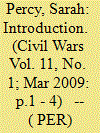

|
|
|
|
|
| Summary/Abstract |
Civil wars are,by their very nature, often characterised by the participation of non-state actors.Because civil wars often occur in situations where the state's authority is weak or non-existent, external actors of all types can play both indirect and direct roles.This special issue seeks to examine these two types of actors combined: What happens when non-state actors external to conflicts paricipate in civil wars?Have new actors of this type appeared on the internationl stage?
|
|
|
|
|
|
|
|
|
|
|
|
|
|
|
|
| 4 |
ID:
086360
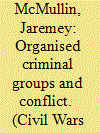

|
|
|
|
|
| Publication |
2009.
|
| Summary/Abstract |
The relationship between criminality and conflict subverts traditional assumptions about organised crime. Consequently, analysis of the 'criminal' must be anchored to specific conflict contexts rather than to a universal typology of organised criminal groups. Organised crime and conflict are interdependent. In several conflict states, organised crime has exacerbated the level of violence and contributed to conflict's intractability. Conflict, meanwhile, creates unique opportunities for criminality to flourish and amplifies the threat that criminal groups pose to security, development and governance. Unless the peculiar supply and demand dynamics of conflict are addressed by the peace process, law enforcement initiatives alone will fail.
|
|
|
|
|
|
|
|
|
|
|
|
|
|
|
|
| 5 |
ID:
086359
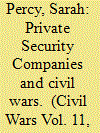

|
|
|
|
|
| Publication |
2009.
|
| Summary/Abstract |
Private security companies (PSCs) have experienced explosive growth since 2001, growth that has been matched only by the consequent explosion in academic attention probing their influence. It is not hard to discover that PSCs and their employees constituted the second-largest member of the US-led Coalition of the Willing during the invasion of Iraq in 2003;1 that this represented a 10-fold increase compared with the first Gulf War in 1991;2 that there are between 15,000 and 50,000 contractors currently operating in Iraq, according to various estimates;3 and that these companies suffer, at the very least, from a dearth of effective regulation4 that some go as far as to call a vacuum.5 However, there has been very little analysis of the consequences of the use of such companies in civil wars. PSCs have the potential, because they are non-state actors, privately motivated, and often external to the conflict, to complicate civil wars. Indeed, the use of PSCs by the US (by far the largest employer of contractors, as PSC employees are often called) has been characterised by a notable absence of planning and policy, both military and governmental. The United Kingdom, which is host to a number of major companies, has similarly failed to examine the policy consequences of the private security industry. This article examines how the absence of effective policy about the effects of privatising force has led to a series of unintended consequences that are influencing and will continue to influence the nature of civil wars. The first section begins by briefly outlining the nature of the private security industry and the roles it plays in civil wars. The second section examines how poor planning has led to problems for the US in its interventions into civil wars, focusing particularly on the private security industry in Iraq. The third section addresses how a similar lack of policy has caused the UK difficulties in the past, and could mean the UK will face problems in conflicts in the future.
|
|
|
|
|
|
|
|
|
|
|
|
|
|
|
|
| 6 |
ID:
086353
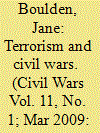

|
|
|
|
|
| Publication |
2009.
|
| Summary/Abstract |
This article reviews the civil war and terrorism literature and then explores the international communities' responses to both. Both the academic literature and the international community tend to approach terrorism and civil war along separate tracks. A key question is whether or not this approach needs to be re-evaluated given the blurring of the distinction between what goes on inside and outside the state when it comes to political violence. If the goal of analysts and the international community is to maintain order, then treating civil wars and terrorism separately may be appropriate. If, however, the goal is to devise more effective means to deal with political violence generally, then the causes of civil war and terrorism must be investigated more closely and the two phenomena must be approached together rather than separately.
|
|
|
|
|
|
|
|
|
|
|
|
|
|
|
|
|
|
|
|
|